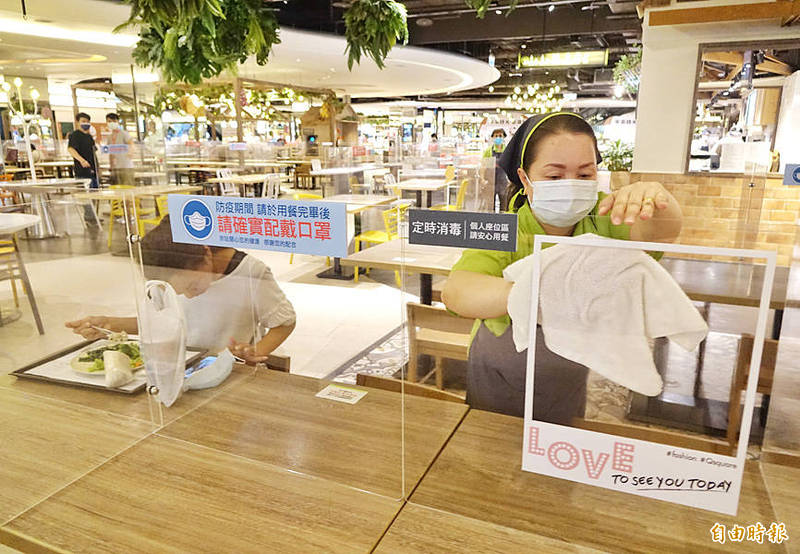《TAIPEI TIMES》 Plastic dividers could aid virus: study

A woman wipes a transparent panel in the food court of a department store in Taipei on Aug. 3, as a diner eats a meal nearby. Photo: Liu Hsin-de, Taipei Times
MORE HARM: Although plastic barriers at restaurants prevent the spread of COVID-19 through coughs and sneezes, they might help it spread through aerosols, the study said
By Jonathan Chin / Staff writer
Plastic dividers at indoor dining venues limit air circulation, which could aid the spread of COVID-19, a study by researchers in Taiwan, Israel and the US showed.
The study, published on Friday in the journal Science, said that respiratory pathogens such as COVID-19 can spread through small aerosols, which can float and travel in airflows and be trapped by plastic dividers designed to block droplet spray from coughs and sneezes.
Droplets or touch alone cannot account for the transmission of SARS-CoV-2 at superspreader events, which are instead likely a result of the movement of the virus in small aerosols, the study’s abstract said.
Unlike droplets, aerosols can stay afloat for hours and move up to 1m to 2m, which is farther than guidelines for social distancing mandate, National Sun Yat-sen University said in a statement yesterday, citing the study’s first author, National Sun Yat-sen University associate professor Wang Chia-chen (王家蓁).
Small aerosols of about 5 micrometers could be inhaled through the nasal cavity and into the upper respiratory system before infecting the bronchi or alveoli in the lungs, Wang said.
COVID-19 test kits, which mainly rely on sampling the nasal cavity, cannot detect the virus in the early stages of infection in the lungs, she said.
While aerosols can carry the virus over long distances, the density of virus-bearing aerosols in the air also increases with proximity to an infected person, which means that aerosols become more infectious at close range, she said.
Most social distancing protocols were designed to counter a virus that spreads through droplets and contact, not aerosols, which helps to explain COVID-19’s persistence, she added.
The study called for measures that mitigate aerosol transmission, such as ultraviolet light disinfection, air filtration and improved ventilation, the study’s abstract said.
Plastic dividers installed in many dining venues and public facilities block droplets, but also reduce air circulation, which increases the dangers of aerosols, the university said.
Citing the study, it said that the government should seek to improve indoor air circulation, install high-efficiency particulate absorbing filters and use ultraviolet lights at indoor facilities to counter aerosol transmission.
These measures should be used along with mandates for wearing masks, social distancing and limits on group gatherings, it added.
新聞來源:TAIPEI TIMES


















